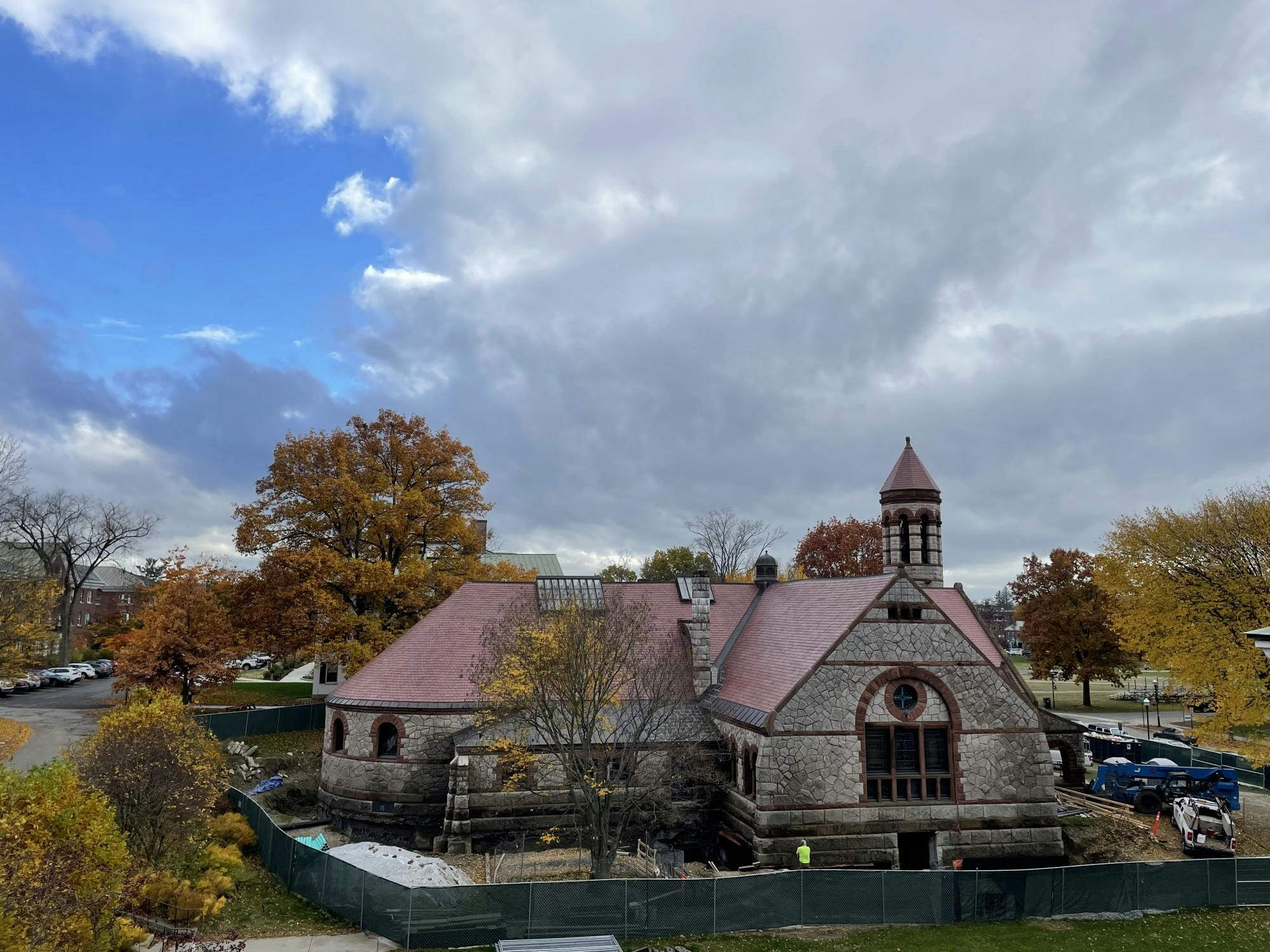I can’t say that I have ever had a particularly dramatic spiritual experience. Sometimes I think it would be cool to be a mystic living in a cave with only visions to keep me company. Unfortunately, I don’t seem to be the sort of person gifted with the kind of temperament to become a desert-dwelling hermit. So, like the rest of us ordinary folk, I am restricted to finding the refuge I can in the sacred spaces around me. Sometimes, these are spaces which do not appear particularly spiritual at first glance.
Elijah Smith ’25, the Tucker Center communications director, told me that he tries to be “conscious of every space I’m in, whether that’s a DOC van, in the library, or at Foco.”
I agree that there’s something uniquely magical about leaving campus in a DOC van before dawn, surrounded by sleep deprivation and the collective dream of seeing a sunrise. Sometimes, locations that aren’t explicitly religious can still provide transcendent experiences.
Given Dartmouth’s rural location, the natural world is a profound source of spiritual experience for some students. Jhozef Sheldia ’24, director of major events at the Tucker Center, shared his appreciation for the spectacularly clear “night sky over the golf course,” where he said that “you can see everything.”
For me, coming from a country that has a tragic lack of deciduous trees, watching the hills around campus slowly turn the color of fire has been truly spiritual.
For many of the students I spoke to, their “sacred space” is also a traditionally religious space. Although it is a secular institution, Dartmouth has a range of flourishing religious spaces, from Aquinas House, to the newly opened Muslim prayer room, to the recent Diwali celebrations. Some of these spaces might not be hugely visible, but they offer tremendous support to those who utilize them.
Some students have found particular value in spiritual spaces — and practices — in light of COVID-19.
“I now feel like I have very strong [spiritual] habits, some of which were developed during COVID,” Richard Lytle ’24 said. “I’m not going to say they wouldn’t have developed otherwise, but I think that having a bunch of time where you weren’t doing anything helped.”
Like Lytle, I found that COVID made me more in touch with my own spirituality. Indeed, this is something that I have observed in many people I know. Friends and acquaintances who had not previously been spiritually inclined have suddenly become regularly engaged in spiritual practice.
It might be tempting to attribute this ‘pandemic spirituality’ to a desire to cope with the sense of existential dread that accompanied isolation, but I don’t think that is correct. Rather, as Lytle said, the sudden solitude of quarantine served as a natural trigger for soul-searching.
As Sheldia put it, “I came here during the pandemic… but in my experience, [the pandemic] actually made spirituality more important because when you live in an environment where human connection at its most basic level, like touch, is lacking, you need another way to connect with people.”
Although I’ve only been at Dartmouth for a short time, I’ve been lucky enough to get involved with the Tucker Center, which works to promote interfaith dialogue on campus. The Center’s mission of promoting ‘conscience and heart’ led to Smith realizing that “the first step before you can show [conscience and heart] is you have to find it yourself.”
Rather than being cave-dwelling mystics, many of us live out our spirituality, getting involved in causes that are important to us. Sometimes, actively contributing to a community or organization can further our individual spiritual growth.
Lytle told me that he’s heard Dartmouth described as a “spiritual desert,” and he thinks that the success-driven, high-pressure academic culture of Dartmouth can act as a major detriment to authentic spirituality.
From the perspective of his Catholic faith, Lytle told me that the key to attracting people to a spiritual life is to show them “love in a completely different way, love that doesn’t care about what other people think or how many possessions you have.”
He was personally drawn into faith by “seeing people live in a really different way,” and thinking that “that person has something real, how do I get there?”
Like Lytle, I have found that the competitive environment at Dartmouth can make it difficult to cultivate a sense of spirituality. For me, the key has been to find time to deliberately withdraw from the pressures of academic life and devote myself purely to my spiritual growth.
One extremely important sacred space on campus, Rollins Chapel, has been closed for COVID and under renovation for so long that no ’24s, ’25s or ’26s have been inside it.
Smith said that “it’s scheduled to be completed in January, emphasis on scheduled.”
Having a central space where the community can engage in its spiritual life will be extremely valuable, and personally I hope to get a chance to peek inside Rollins before I return to New Zealand.
But, in the absence of this central sacred space, Dartmouth students are finding spiritual fulfillment in a variety of ways. Dartmouth’s spiritual community is alive and well, if you just take a closer look. There are many ways for Dartmouth students to find a sacred space that fits them, whether it’s a student group centered in a particular faith, an interfaith forum like the Tucker Center or even a sunrise trip in a DOC van.




